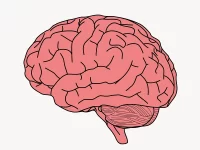Four years ago, the COVID-19 pandemic stole millions of childhoods. Scientists raised concerns about the pandemic’s effects on development, education, and socialization, but the outcomes remain vastly evasive. Now, a new study has revealed that the adolescent brain experienced unusually fast maturation during lockdown — particularly in females.
“Female brains aged significantly faster than male brains throughout the pandemic.”
In September 2024, a longitudinal study from the University of Washington used MRI analysis to discover that female brains aged significantly faster than male brains during the pandemic. Accelerated cortical thinning indicative of aging occurred in post-COVID brains across the board. However, the damage was greater in magnitude and more widespread in females, with increased cortical thinning found in 30 brain regions across both hemispheres. When these physiological changes were evaluated in terms of equivalent years of development, the average extent of premature acceleration was 4.2 years in females, compared to only 1.4 years in males. This means that for females, what presented as a 19-year-old brain actually belonged to a 15-year-old girl.
“The average extent of premature acceleration was 4.2 years in females, compared to only 1.4 years in males.”
The cortical thinning found was much greater than the researchers expected in the three-year period between the first scan and the follow-up. The most affected regions in females were all linked to social cognition, which correlates with the anti-social conditions of lockdown. Research shows that for females, peer relationships are of vital importance for the development of self-identity and they rely on these relationships for emotional support more than males. As female friendships and interpersonal relationships declined during COVID-19, so did the brain areas facilitating them. The heightened mental impact of prolonged isolation on females thus resulted in a cascade of physiological effects.
“The heightened mental impact of prolonged isolation on females thus resulted in a cascade of physiological effects.”
Thinning of the cortex is associated with the typical consequences of aging, such as slower processing time, less flexible thinking, and general cognitive decline. Accelerated brain maturation is also linked to increased risk for development of neuropsychiatric and behavioral disorders. Given the increase in mental health disorders during the pandemic, these findings raise questions about the relationship between mental health and premature brain maturation.
Cortical thinning and accelerated aging are potential neurophysiological bases for the mental and behavioral challenges faced by females during the pandemic. Adolescence is a critical period for social and emotional development, and the opportunities for teenage brains to engage in these activities were stunted by the lockdown. Cortical tissue cannot regrow and will continue to shrink throughout life, indicating that the lack of socialization caused irreparable physiological damage.
The results of this study highlight the importance of providing ongoing support to adolescents who lived through the COVID-19 pandemic. The impact on growth and development, particularly in females, is significant, and there is still much more to learn about the extent of psychological harm caused by COVID-19. However, despite the data, this is not a hopeless cause. The pandemic-related social deficits are not permanent, and adolescents are able to recover and regrow their social and emotional capacities. Teenagers across the world are beginning to catch up on all they missed out on, and scientists are continuing to find ways to support them as they grow into adults in a post-COVID society.






